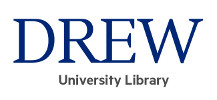 Library Guides
Library Guides Library Guides
Library GuidesMost libraries will have access to other resources about literature, including the Contemporary (and other) Literary Criticism series, Contemporary Authors, Something about the Author, etc. Depending on the library, these may be available online-- or not. Be sure to check to see what resources the library/libraries you use have!
Most statewide library consortia make available specified search engines for elementary and high school students, which often provide content specified to a certain reading/understanding level. Here are some examples that we have through the Jerseyclicks (New Jersey State Library) database selection

If you are searching in Scholar Search, you will see both books and articles.
Some databases have full text incorporated in them; almost all of our databases, however, are connected to "Find it @Drew" which will check all our electronic journal sources to see if an article is available.
If the articles are directly connected into the database, it will give you a direct link to the PDF or HTML or Linked full text; some items will be not in our collection and you'll be directed to request them through Interlibrary Loan.
For many, you'll need to click Find it @Drew to see whether it's available electronically:

When you click Find it @Drew you will be taken to a page that will offer you a list of links to the resource in our electronic journal holdings. (Sometimes we have a journal article via more than one database; that's why you see multiple links. Click one of the links to get to the full text:

If we don't have access to the journal/article online, Find it @Drew will give you links
NOTE: The first time you request an article or book via ILLiad (our InterLibraryLoan system), you will be asked to fill out a short form. It may take several days to receive an article via InterLibraryLoan; books can take longer.
If you already have information about a specific article (author, journal or magazine title, title of the article, etc.), use Drew's Journal List Search. Enter the title of the journal or magazine, and then drill down to the specific item you need.
Selective index of journal articles in Education and reports in Education from 1966 to the present.

Library databases general use 'boolean logic,' 'keyword,' and 'controlled vocabulary' (subject heading) searches rather than Google-type 'natural language searching'
When searching in ERIC or any other library-type database, you want to separate your topic into concepts and connect them with boolean logic (and parentheses, if necessary).
Other search tiips

ERIC has snazzy ways to limit your results:
In the limits drop-downs, you can use Ctrl-click or Shift-click select more than one term.
Questions? Need Help? Email reference@drew.edu
Drew University Library, http://www.drew.edu/library